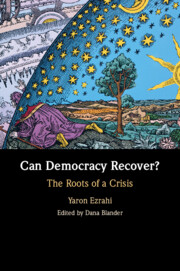Book contents
- Can Democracy Recover?
- Can Democracy Recover?
- Copyright page
- Dedication
- Contents
- Preface
- Words from the Author
- Introduction
- Part I The Rise of Western Politics following the Collapse of the Monistic Medieval Cosmology
- Part II The Emergence of the Epistemological Constitution of Modern Democracy
- Part III The Dialectics of Objectification
- Part IV The Erosion of the Epistemological Constitution of Modern Democracy
- Part V Democracy beyond Modernity
- 17 Early Modernizers of Politics
- 18 Modern Critics of Democracy
- Can Democracy Recover? Concluding Reflections
- Epilogue
- Index
18 - Modern Critics of Democracy
from Part V - Democracy beyond Modernity
Published online by Cambridge University Press: 02 January 2025
- Can Democracy Recover?
- Can Democracy Recover?
- Copyright page
- Dedication
- Contents
- Preface
- Words from the Author
- Introduction
- Part I The Rise of Western Politics following the Collapse of the Monistic Medieval Cosmology
- Part II The Emergence of the Epistemological Constitution of Modern Democracy
- Part III The Dialectics of Objectification
- Part IV The Erosion of the Epistemological Constitution of Modern Democracy
- Part V Democracy beyond Modernity
- 17 Early Modernizers of Politics
- 18 Modern Critics of Democracy
- Can Democracy Recover? Concluding Reflections
- Epilogue
- Index
Summary
This chapter explores the critiques of modern liberal democracy presented by Carl Schmitt and Michel Foucault. Both thinkers challenge the foundational premises of liberal democracy, questioning the role of the individual citizen as a political agent. Foucault, through his concept of power, challenged the view of the modern individual as a free political agent. For Schmitt, the rivalry between friend and foe is so deep that it politicizes all other areas. In his view, antagonism between communities is the driving force of political life. The analysis extends to Bruno Latour, who challenges the dualistic cosmology inherent in modern democracy. Latour proposes a secular monistic cosmology, blurring distinctions between Nature/Culture, individuals and objects. He criticizes the reliance on external facts and on the separation between subject and object. Latour proposes the mother tongue as a basis for commonsense, but unlike the perception of liberal democracy, it does not rely on a scientific epistemology of cause and effect or objectivity. The chapter contends that the decay of democratic practices and the widening gap between democratic ideals and realities may necessitate novel imaginaries.
- Type
- Chapter
- Information
- Can Democracy Recover?The Roots of a Crisis, pp. 180 - 191Publisher: Cambridge University PressPrint publication year: 2025

